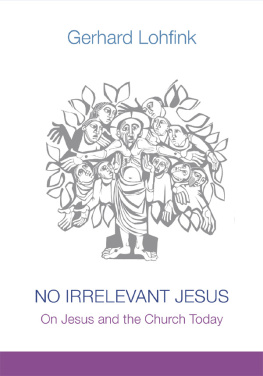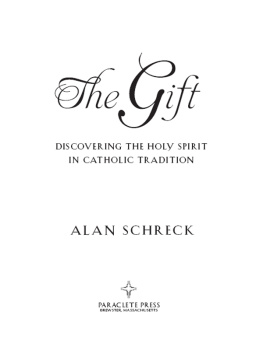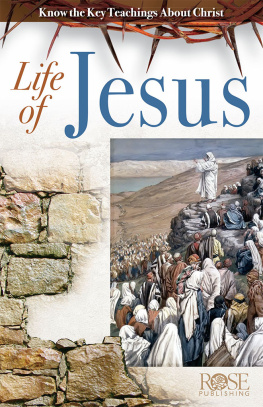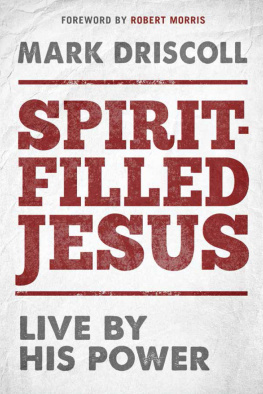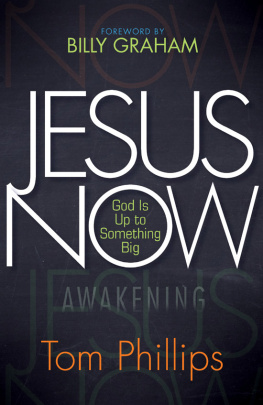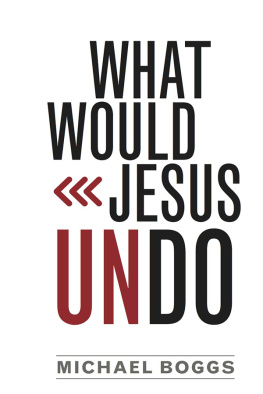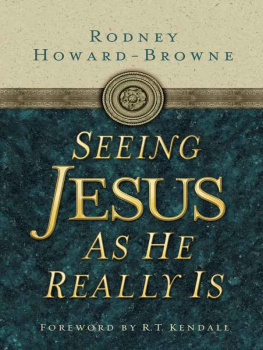Jesus
what
catholics
believe
Alan Schreck
Unless otherwise noted, Scripture passages have been taken from the Revised Standard Version , Catholic edition. Copyright 1946, 1952, 1971 by the Division of Christian Education of the National Council of Churches of Christ in the USA. Used by permission. All rights reserved.
Quotes are taken from the English translation of the Catechism of the Catholic Church for the United States of America (indicated as CCC, ), 2nd ed. Copyright 1997 by United States Catholic ConferenceLibreria Editrice Vaticana.
Vatican II quotations are taken from Austin Flannery, ed., Vatican Council II: The Conciliar and Post Conciliar Documents, New Revised Edition, vol. 1, cop y right 1996, Costello Publishing Company, Northport, New York.
Cover and book design by Mark Sullivan
Cover image PhotoXpress | Polis Poliviou
Library of Congress Cataloging-in-Publication Data
Schreck, Alan.
Jesus : what Catholics believe / Alan Schreck.
p. cm.
Includes bibliographical references.
ISBN 978-1-61636-319-2 (alk. paper)
1. Jesus Christ. 2. Catholic ChurchDoctrines. I. Title.
BT203.S25175 2012
232dc23
2012028915
PRINT ISBN 978-1-61636-319-2
E-BOOK ISBN 978-1-61636-568-4
Copyright 2012, Alan Schreck. All rights reserved.
Published by Servant Books, an imprint of Franciscan Media.
28 W. Liberty St.
Cincinnati, OH 45202
www.FranciscanMedia.org
www.ServantBooks.org
contents
Preface
Chapter One
Will the Real Jesus Please Stand Up?
Chapter Two
Jesus From Above, Jesus From Below
Chapter Three
The Mission of Jesus
Chapter Four
The Challenge of Discipleship
Chapter Five
How Jesus Saves Us: The Mystery of the Cross
Chapter Six
The Hope of the Resurrection, Christs Ascension,
and the Eternal Kingship
Chapter Seven
Lunatic, Liar, or Lord? The Case for the
Divinity of Jesus
Chapter Eight
Jesus in the Catholic Tradition
Notes
To Fr. Francis Martin
A biblical scholar and holy man
who tirelessly has proclaimed Jesus
and has reflected him in his life
and ministry.
preface
It is a humbling task to write about Jesus of Nazareth, whom Chri s tians profess is the Christ, the Messiah, the Eternal Son and Word of God the Father incarnate, the Savior of humankind, Creator of the cosmos, and sove r eign ruler of heaven and earth. In him are all the treasures of wisdom and knowledge, of truth, beauty, goodness, and love. Before him every knee in heaven and on earth must bow, and every tongue will (at the end of time) confess him as Lord (see Ph i lippians 2:1011).
All I say in this book will be woefully inadequate to describe the One whom we will only really know when we are blessed to see him face-to-face (see 1 Corinthians 13:12). And yet Catholics must indeed express what we believe about Jesus, for two primary reasons: (1) because human salvation is found in Jesus alone (see Acts 4:12), and (2) because Jesus commissioned us to proclaim to the world who he is (see Matthew 28:1920).
This book will not focus on the various positions of modern the o logians and biblical scholars (as important and interesting as these may be) but will highlight what all Catholics believe (or ought to believe) about Jesus. I will refer to theologians and biblical scholars at points where this seems helpful or necessary to elucidate Catholic belief.
The authoritative sources of what Catholics believe are Sacred Scripture and Sacred Tradition as passed on, proclaimed, and inte r preted by the living teaching office of the church (her magisterium ), which Jesus himself established (see Luke 10:16, He who hears you, hears). One of the most reliable presentations of these is the Cat e chism of the Catholic Church .
Many things that the New Testament (the Gospels particularly) records about the teachings and actions of J e sus are extreme or challenging, both to his hearers nearly two thousand years ago and to us today. In this book I strive to present these as they are recorded, not watered down. My perspective is that if the biblical accounts do not strongly challenge and convict us (as well as console, encourage, and strengthen us), we are not encountering the real Jesus. I acknowledge that Catholics sometimes differ in their interpretations of particular biblical texts. The church does not normally define pr e cisely the meaning of texts except to clarify or safeguard certain truths that she believes are essential.
For example, texts about the resurrection of Jesus must be understood as saying that the Jesus who was cruc i fied truly appeared alive to his followers in his own glorified, risen body. The risen Jesus was not a ghost, a ha l lucination, or a symptom of psychological stress. This was not a story that his followers told to give them hope or to make some other subjective point about Jesuss continued presence with them in spirit, ideal, or memory.
My goal is to present not a set of doctrines but the consummate importance and the power of the encounter that we Catholics have with the almighty and living God in the Person of Jesus Christ. Let us pray that the Holy Spi r itthe Spirit of Truth who alone enables us to confess that Jesus is Lord (1 Corinthians 12:3)will reveal J e sus ever more fully to us.
chapter one
Will the Real Jesus Please Stand Up?
If one asks a Catholic today what he or she believes about Jesus, it would be understandable if the response was, Which Jesus?
Dont scholars tell us that it is unclear who Jesus actually was: a revolutionary, a social reformer, a marginal (or radical) Jew posing as a rabbi, a prophet predicting the end times? Arent the so-called Gnostic gospels or the recently discovered Judas Gospel just as i m portant in understanding Jesus as are the Gospels of Matthew, Mark, Luke, and John? Havent modern novelists, like Nikos Kazantzakis and even Dan Brown, challenged us to co n sider Jesus in a different, more human light? How do Catholics sort out all the different views of who Jesus is?
Lets consider these questions from an historical perspective.
Portraits of Jesus
The vital question raised by Jesuss Jewish contemporaries was whether he could be the long-awaited Messiah, the Christ. (Both terms mean, one in Hebrew and one in Greek, Gods anointed one.) However, it would be unthinkable for a Jew to think that the Messiah would be God himself, for the linchpin of Jewish belief was that there is one God. Perhaps the Messiah would be an influential rabbi, a prophet, or even a kingbut not in any way God or divine. That would be blasphemy and the height of arrogance. The Christian Gospels report that J e suss claim to divinity is exactly why the Jewish authorities condemned him.
Most of the Jewish community of Jesuss day did not even believe that he was the Messiah. His ignominious death by crucifixion after no more than three years of public life seemed to confirm this. Jesuss followers viewed his resurrection as a sign that he was the long-awaited Messiah of Israel, and it confirmed their growing belief that he was more than an ordinary human person.
Those opposed to Christianity claimed that Jesus was simply a human being who could make mistakes and even sin. If Jesus had fo l lowers, it was because his teachings were clear and powerful, and he had strong personal charism and led an exemplary life. But hadnt one of his own disciples betrayed him and all but one or two aba n doned him? And didnt both Jewish and Roman authorities condemn him to death? This gave rise to many portraits of Jesus as a noble, tragic figure who, for a time, won the allegiance of a relatively small group whose hopes and imaginations he had stirred.
Another, totally different view of Jesus claimed that he was not an ordinary (or even extraordinary) human person but was actually a spirit dwelling in the world in human appearance. As a spirit who transcended the normal realm of human existence, he was able to set his followers free from the bondage of human weakness and inevitable corruption. Jesus was a god, perhaps the one true God (as Christians appeared to claim) who had come to give his followers a gospelsecret knowledge ( gnosis in Greek) that would free the human race from the evils of earthly life: pain, suffering, and sorrow.
Next page

